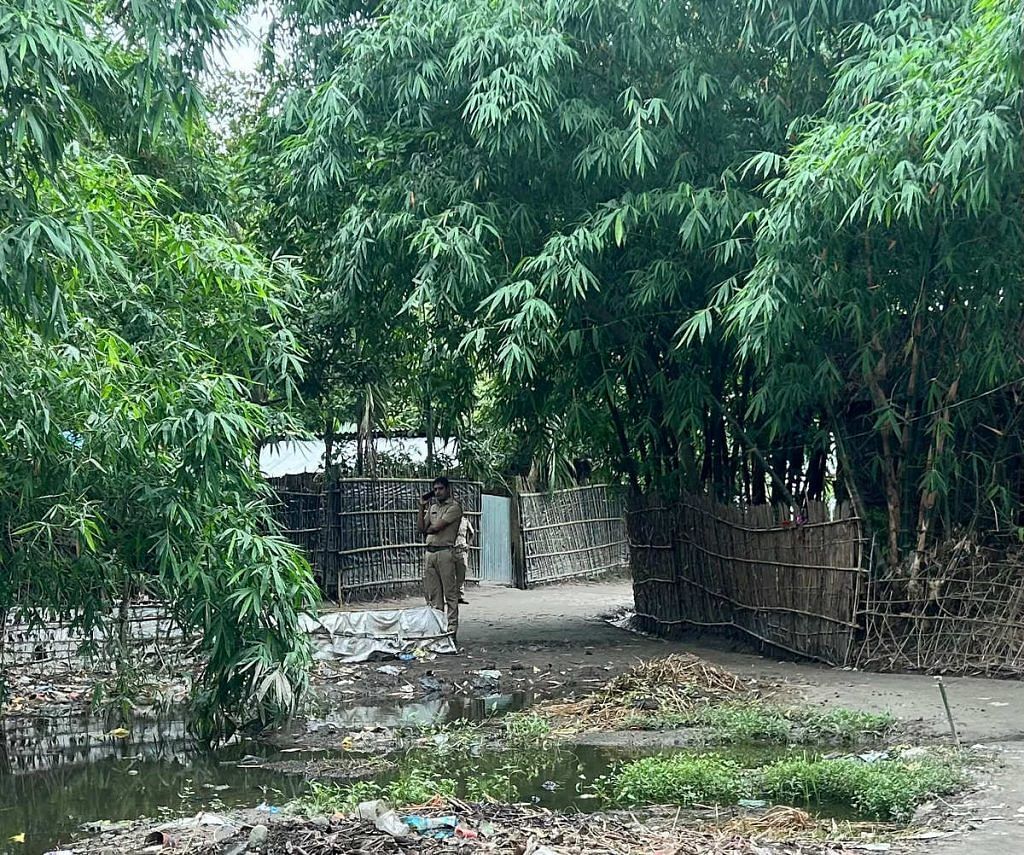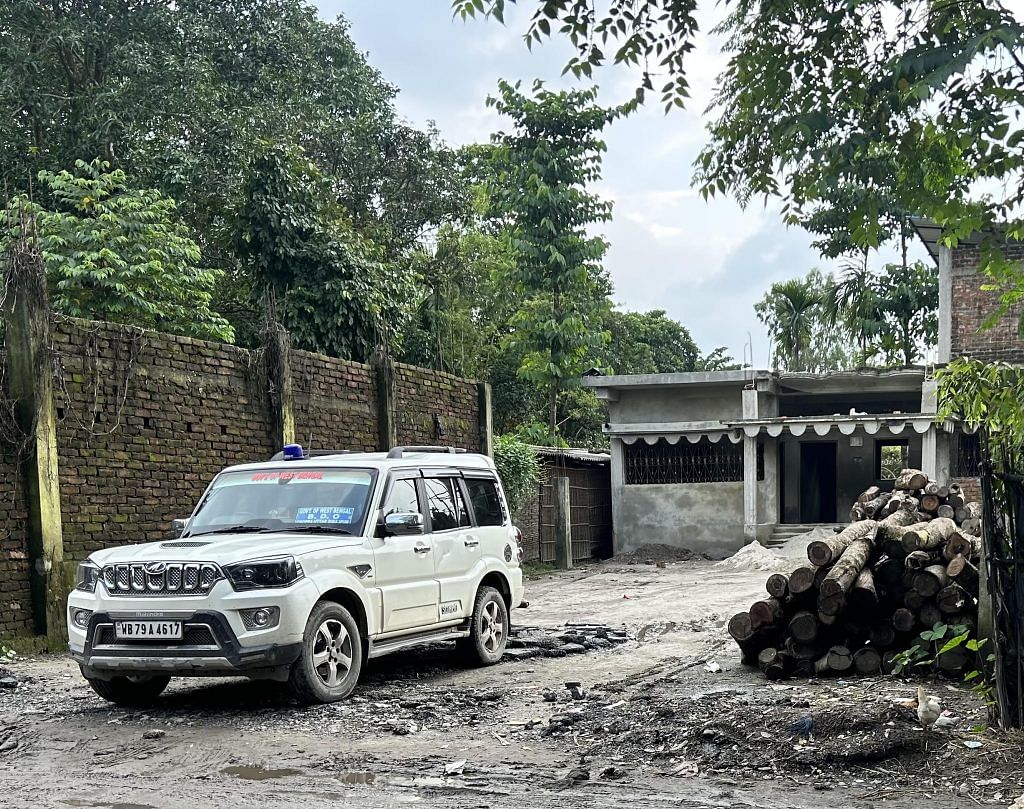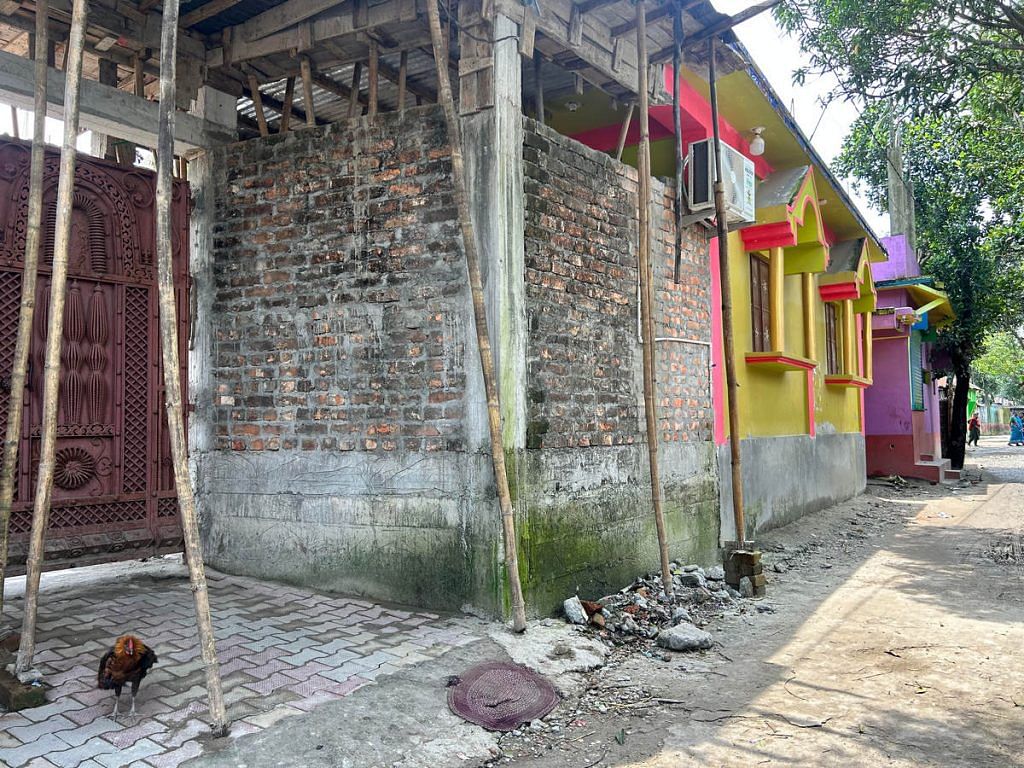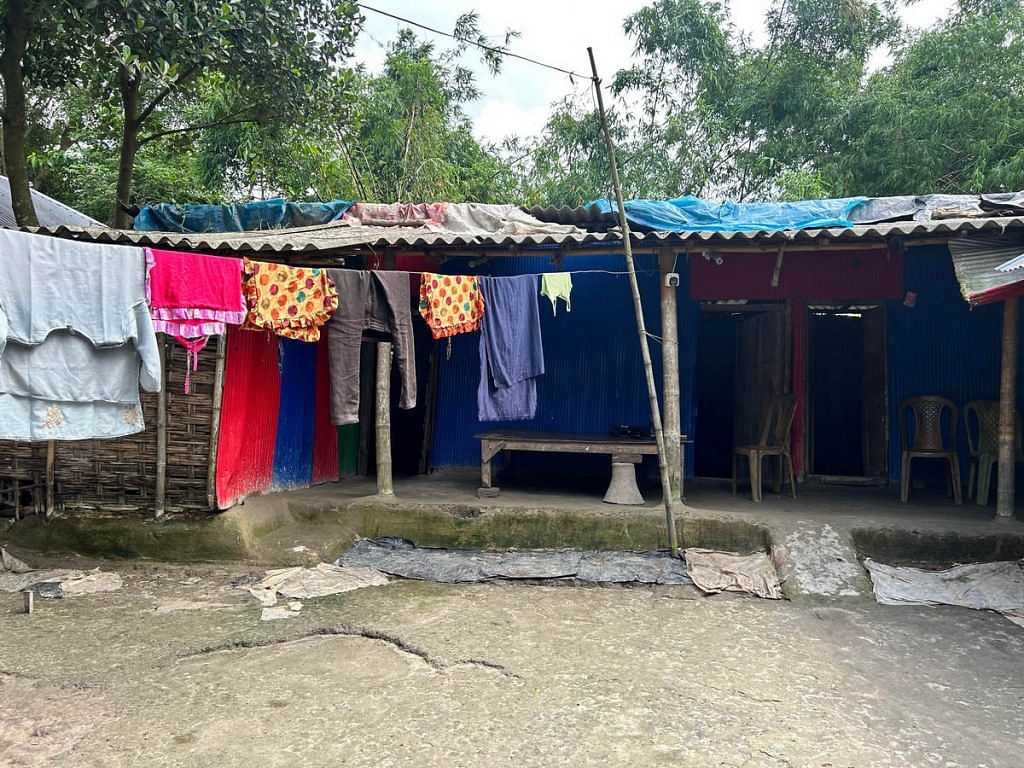Chopra (Uttar Dinajpur): The woman kept her extra-marital love a secret for five years. But when Lakshmipur village in West Bengal got to know, a kangaroo court, called the insaaf sabha, was called. The lovers had to be punished. Villagers gathered to watch as the sabha condemned her romance as a ‘dirty act’ and a ‘crime’. Then its leader, a local Trinamool Congress muscleman called Tajemul ‘JCB’ Islam, pushed her to the ground, kicked her in her private parts, yanked her hair, and mercilessly flogged her with sticks.
Such instant ‘justice’ has been meted out for years in the dreaded Tajemul Islam’s court in Uttar Dinajpur district’s Chopra block. This and other kangaroo courts operate in an ungovernable belt of West Bengal where villagers fear local party goons, police shrug helplessly, politicians look the other way, and a code of silence keeps everyone complicit.
“We are not allowed to speak. We stay neutral and do our business, earn our livelihood, and feed our family. We don’t protest, we don’t speak out even if we know what is happening,” said a hardware shop owner who was born and raised in Chopra. Like many others here, he was reluctant to talk about Tajemul Islam or the insaaf sabhas and asked to not be named.
But on 28 June, a villager pulled out his cell phone and recorded the flogging. The video went viral, sparking national outrage and leading to the arrest of Islam and three others. Just a day later, another report emerged about a woman, Sabita Barman, who killed herself after a similar assault following an extramarital relationship in Jalpaiguri district.

These incidents have led to a fresh volley of criticism against the Mamata Banerjee government about its alleged acceptance of brutal extra-judicial “JCB justice” and failure to protect citizens. Last week, Prime Minister Narendra Modi addressed the incident in the Rajya Sabha, drawing parallels with the Sandeshkhali case, where a TMC leader was accused of terrorising villagers and sexually assaulting women.
“Even those who see themselves as progressive female leaders are tongue-tied. Their politics is selective,” the PM remarked in a veiled jab at CM Banerjee. The TMC, meanwhile, has written to the Rajya Sabha chairman to expunge this part of the PM’s speech.
I don’t know anything about these sabhas, but I know, I have not committed a crime. Is it a crime to fall in love?
-MN, woman victim of Chopra flogging
Mamata is yet to comment publicly on the case, but TMC leader Kunal Ghosh posted on X that no political leader should try to “defend” the act. “The silent spectators are also responsible and must be booked,” he wrote as the video continued to garner views.
“Villagers want to avoid police for more than one reason and feel the powerful person in the village can bring justice quickly and thus they trust such insaaf sabhas but this is the first time we have seen such a video and fighting such a case,” said Janardhan Prasad Singha, assistant public prosecutor at the Additional Chief Judicial Magistrate court in Islampur, which covers Chopra.
Ironically, a week after her public Taliban-like punishment, the woman, 35-year-old MN, says she is the happiest she has ever been. Her secret romance is now out, and she has faced her worst fear. She can breathe easy. She now lives in a tiny room in the home of her lover, his wife, and their four children. All she says is, “love is blind”.

She wants to put the events of 28 June behind her. That day she and her partner were summoned to the insaaf sabha at 5 pm by Tajemul Islam, only a few metres from where she now lives. She said she was apprehensive but thought the insaaf sabha would help her get a talaq (divorce) from her husband so she could remarry.
“My husband has thrown me out of the house. He found out I was talking to his friend over the phone all the time. Is it a crime to fall in love?” she told ThePrint. Her elder son is a migrant worker in Sikkim and her daughter studies in class 11.
MN claimed she knew nothing about the man who flogged her or the video. Like most villagers, she found out from the news that she was now in the headlines and her public flogging a national talking point.
“I don’t know anything about these sabhas,” she said. “But I know, I have not committed a crime.”
In times of trouble, villagers line up at JCB’s door for help. He is like a benevolent bully, a sort of a Robin Hood, a mix of goonda and guardian, who inspires both fear and faith.
Also Read: Newlyweds who sought police cover shot dead in Haryana in 3rd case of ‘honour killing’ this month
Fear vs admiration
Fear runs so deep in Lakshmipur that speaking out against Tajemul Islam is almost sacrilegious. Everyone has stories they’ve witnessed or heard at the village markets, but no one dares to go into detail. They call him JCB—the dreaded bulldozing machine. He is synonymous with unbridled, unaccountable power in the area.
At the Lakshmipur market, police patrolling continues after the insaaf sabha video exploded online. Rapid Action Force personnel stand guard to ensure there are no flare-ups or political clashes.
Islam was arrested on 30 June after the police filed a suo motu case under IPC sections 341 (wrongful restraint), 323 (voluntarily causing hurt), 354 (criminal force to outrage modesty of women), and 307 (attempt to murder), among others. He is now in police custody along with three others identified from the video.
Yet, the trepidation remains palpable.
The muscleman doesn’t just dole out punishments, but also extorts local schools, tea gardens, petrol pumps, and sand transporters, allege opposition political leaders in the area.

Most local residents, however, only hint at the dread instilled by JCB and his henchmen.
At the dilapidated primary school in Digha Colony, for example, all the doors, lights, and fans were stolen during the pandemic, according to the headmistress, but she stopped short of naming anyone.
“You know who can have the power to steal from a government property,” she said with a resigned smile. “If we cooperate with the party, we don’t face any problem. The students mainly come to eat the midday meal and then go home. We have complained many times to the authorities, but we have not received any help.”
Elsewhere in the village, it is hard to tell the difference between fear and admiration for JCB. Some hail him as a hero who did nothing wrong and doesn’t deserve to be in prison.
He is not a criminal. He is God for us. He had gone to that village to teach a lesson to the couple. Allah doesn’t allow breaking marriages. He helps everyone in need, he also helps police
-A resident of Chopra
“Tajemul is not a criminal. He is our hero and he helps everyone in need,” said a woman with a toddler in her arms.
Born and brought up in Dangpur village of Chopra, 27-year-old Islam is the youngest of nine siblings and only studied until Class 4. His sister Samina told ThePrint he always loved to eat, and his older siblings would sacrifice the beef leg, his favourite cut, for him. This love of food is what earned him his nickname, she claimed.
“Since he was a teenager, he was called JCB and it stuck on because he was big built. The TMC leaders would also jokingly call him JCB. I did not like it one bit since it sounded negative,” she added.
JCB’s house, where he lived with his mother, wife, and two children, stands tall amid thatched roofs—it’s almost palatial compared to the village’s poverty. Freshly painted and colourful, with a tall boundary wall, split AC unit, and large iron gates under construction, it speaks of wealth in a place where many are accustomed to walking barefoot and live under asbestos sheets. Now the gates are locked and the windows boarded up.

Dangpur village has a light post, courtesy JCB, setting it apart from its even more ramshackle neighbours.
“He is not a criminal. He is God for us. He had gone to that village to teach a lesson to the couple. Allah doesn’t allow breaking marriages. He helps everyone in need, he also helps police and now the police have arrested him,” said another villager standing beside JCB’s brother in a show of support.
In times of trouble, villagers line up at JCB’s door for help. He is like a benevolent bully, a sort of a Robin Hood, a mix of goonda and guardian, who inspires both fear and faith.
“My brother helps the villagers with Rs 5 lakh during weddings. He is always one call away. He is a leader and everyone here respects him,” said Samina. “Without his help, the TMC would not have won elections. The MLA has spoken in our favour but why is the police not leaving him? We want him back as soon as possible.”
Islam is reported to be close to Chopra MLA Hamidul Rahman, although the leader has distanced himself.
Samina, meanwhile, plans to cook her brother’s favourite dish upon his return. Their mother struggles with sleep, and his young sons, both in lower primary school, keep asking about him, she complains.
“We lie to his sons,” she said. “The house feels empty without him.”
As Samina urges gathered villagers to speak positively about JCB, some concur that the viral video is a political attempt to defame him.
However, a police official looking into the case said he hadn’t seen anything so heinous in his life.
“Illiteracy is a major factor in villagers preferring to settle family disputes this way. We weren’t aware that such punishment is meted out and this is the first time I have seen anything like this. This is very, very wrong,” he told ThePrint on condition of anonymity. “It is a good thing the video went viral and the criminal is behind bars.”
The consensus in the village is in favour of these kangaroo courts, with much of their collective ire directed toward the woman.
Power & clout
MN and her lover were flogged on the main road, with the video recorded from the first-floor parapet of an uninhabited, under-construction house. Police officials say they have not been able to trace the person who made the video.
Lakshmipur resident Hushara Begum, who has a shop nearby, said she heard shrill cries for help and jumped out to see the pair being beaten.
“I did not know about any insaaf sabha. I heard the noises and stepped out. I don’t know why they were being beaten and did not want to interfere. I shut the shop and went home,” she told ThePrint.
The incessant rain has nearly washed away the crime scene, leaving only small puddles, and villagers are not forthcoming about the details.
There is neither morality nor logic in this form of justice. The sabhas are backed by the ruling power and police administration, and they are the manifestation of ugly electoral politics.
-Dr Sanjoy Roy, sociology professor at North Bengal University
The police are largely relying on the viral video for their investigation. Their social media monitoring team first spotted the video, after which it was verified, leading to four arrests, including Islam, so far. The police are still conducting nighttime raids to apprehend more people seen in the video.
But the consensus in the village is in favour of these kangaroo courts, with much of their collective ire directed toward the woman, who, as seen in the video, was beaten far more severely than her partner.
“She has brought shame to this village, even seeing her face is a sin. We have young girls in this village. What will they learn from this? Because of her we had an insaaf sabha here. What if they return to the village and create a ruckus? How is she living in that house? Imagine the first wife, her life is ruined. Two marriages are ruined because of one woman,” said Shabnam Begum, a resident of Chopra.
Even Chopra MLA Hamidul Rahman, while distancing the Trinamool Congress from JCB, controversially said that the woman being flogged was “evil”. He also boasted that the TMC had a 1 lakh vote lead from the area in the Lok Sabha elections.

“Here in Chopra, if you even raise any other political flag other than TMC, you will be marked and tortured. Criminals like JCB act as muscle power for the ruling party. They do all kinds of anti-social work,” alleged CPI-M leader Anwarul Haque, secretary of its Uttar Dinajpur unit.
The TMC’s political clout in Chopra is so strong that it won the Panchayat polls uncontested last year. As for JCB, he was out on bail in at least 12 other cases, including the murder of a CPI-M worker who was shot dead near the Block Development Office while filing panchayat nominations in December 2023 in Chopra.
Meanwhile, on 8 July, the West Bengal police booked BJP IT cell head Amit Malviya CPI-M state secretary Mohammed Salim for defamation, obscenity, insult to the modesty of a woman, and other sections after MN filed a complaint against them for circulating the video of the flogging.
In the wake of this, Malviya wrote on X: “Mamata Banerjee continues to use victims of rape, sexual assault and now public flogging to protect criminals like Sheikh Shahjahan and Tajemul Islam (alias JCB), and to target political opponents.”
The CPI-M has also accused the Mamata government of targeting Salim to protect “TMC criminals”.
Condemn WB govt for filing FIR against @salimdotcomrade for rightly exposing the horrendous case of TMC Goonda Raj in Chopra where a woman had been publicly beaten by TMC criminals.
We demand immediate withdrawal of FIR. https://t.co/TKSdRVsv2f
— CPI (M) (@cpimspeak) July 8, 2024
Evolution of insaaf sabhas
Insaaf sabhas are not just about dispensing comeuppance but also a way for musclemen to earn funds by pocketing ‘fines’ collected for various transgressions, alleged CPI-M’s Haque.
“They keep most of this money, but sometimes a part of it is also given to the villagers to keep them happy and avoid any uprising,” he said. “Even panchayat members are now involved in insaaf sabhas which would initially involve the older villagers to decide the fate of the disputes.”
Insaaf or salishe sabhas began as non-judicial mechanisms for resolving disputes in areas with limited police and legal reach. However, they have morphed into political tools over time, according to Dr Sanjoy Roy, a sociology professor at North Bengal University.
If I had no issue with my wife, who were the neighbours to object?
-Tapash Barman, whose wife Sabita was attacked
“Such sabhas go back to an era long before the British ruled the nation. There were self-sufficient village communities comprising the rural elite, such as those who had land holdings or belonged to the upper caste. Tribals had their own panchayat to resolve marriage disputes, land disputes, and impose penalties,” he said. “This would also have a religious aspect but there was social and cultural legitimation.”
These insaaf sabhas have eventually become platforms to showcase raw power, appealing to ultra-conservative sections of the electorate.
“There is neither morality nor logic in this form of justice. The sabhas are backed by the ruling power and police administration, and they are the manifestation of ugly electoral politics. The ruling party is dependent completely on them,” Roy alleged.
Also Read: Rural Haryana is at war with love marriage—brother shoots sister, boasts on Instagram with gun
Love, forgiveness, death
The salwar-kameez that MN wore on the day of the flogging is washed and neatly folded by her pillow, but all her other clothes are at her marital home. She has no plans of returning and has borrowed some outfits from her partner’s wife. Police and women civic volunteers sit outside her room, along with two newly installed CCTV cameras that rarely work because of constant power cuts. Stepping out is still not safe.
But that doesn’t stop MN from being excited about the future.

“I will go out when I have to visit the court for my talaq so I can remarry,” she said. She studied till Class 8 and was married at the age of 12. Falling in love was a decision she made for herself.
“We will have a feast. I want to get married in Islampur (closest township),” she added.
MN smiled as her partner entered the room to check on her. He handed her the mobile phone that had facilitated their connection years ago and then went back to his wife.
“He was constructing our house five years ago when I first saw him. Then we started talking. He asked for my phone number, and we would talk over the phone all the time. I don’t know, I just loved talking to him and we fell in love. He said he would die if we didn’t get married and so I left my house for him. This is now my new house,” MN said.
Things appear to have worked out for her, even though she had to pay a price for it. She has made peace with the punishment the village handed to her.
But for some, courage fails and the humiliation is too much to bear.
In the adjoining district of Jalpaiguri, Fulbari resident Sabita Barman eloped with her neighbor, Sagar Roy. A week later, on 29 June, when she wanted to return home, the neighbours threatened to burn down the house if her husband Tapash took her back.
“Sabita was roughed up in front of the panchayat members. She then took permission to use the washroom, but when she didn’t return for a while, I rushed in. She was lying on the floor and had consumed pesticide,” Tapash told ThePrint. “When we reached the hospital, she was declared dead.”
The Siliguri Metropolitan Police have handed the “suicide case” over to the Detective Department and arrested four persons based on the complaint filed by Sabita’s husband and brother.
“We were together for 25 years. I was 16, and she was just 14 when we got married,” said a distraught Tapash, his voice breaking. “If I had no issue with my wife, who were the neighbours to object?”
(Edited by Asavari Singh)







Insaf Sabha are the Bengali counterparts of Haryanvi Khaps.
Both do the same: promote the interests of local, conservative powers.
Both are tools of local gundas.